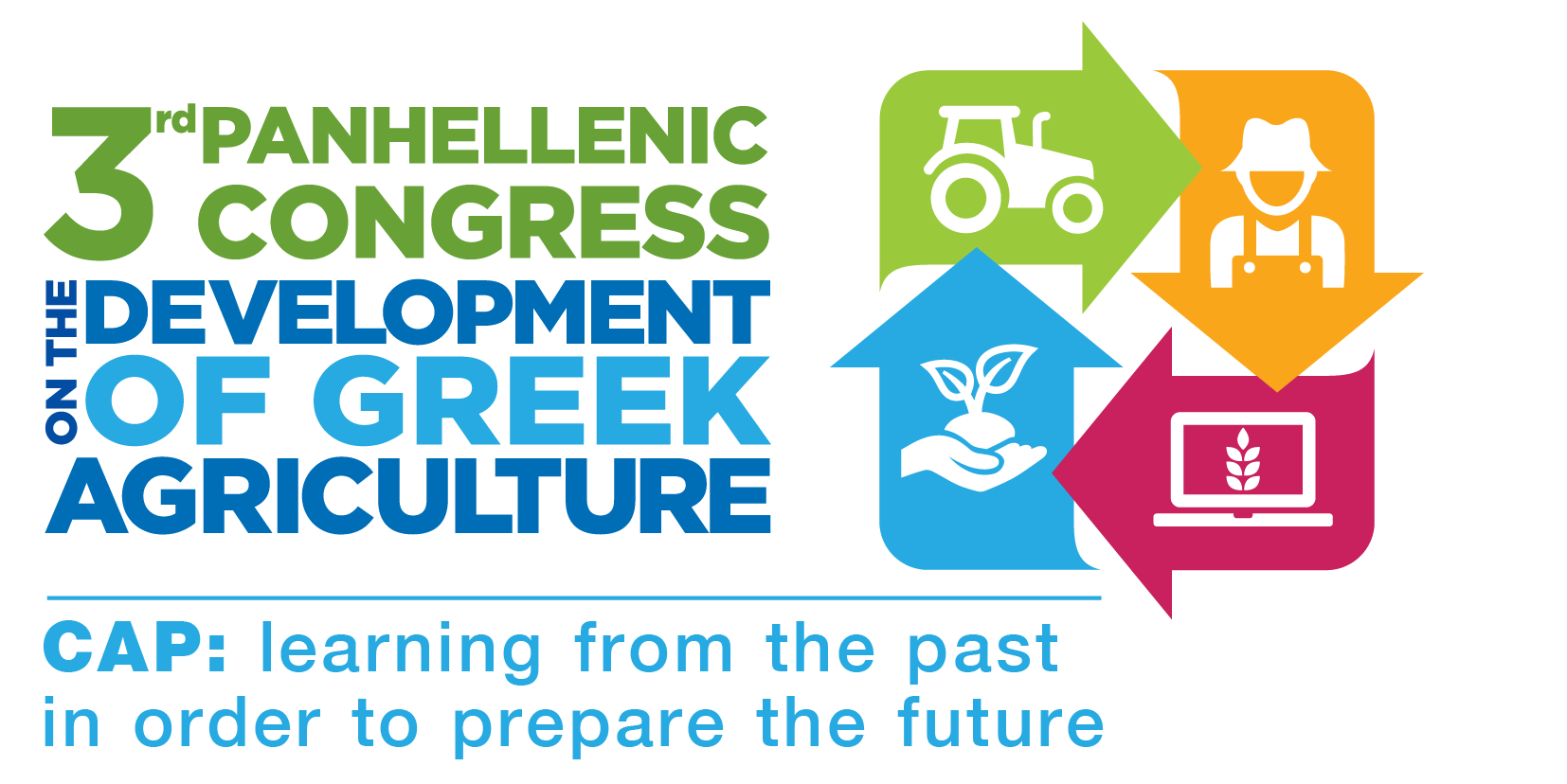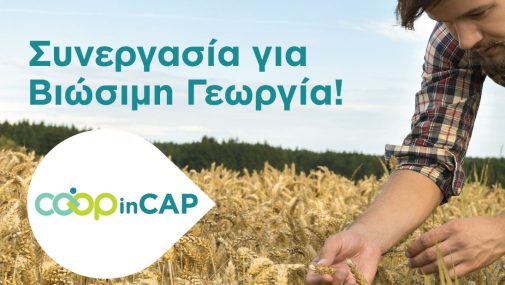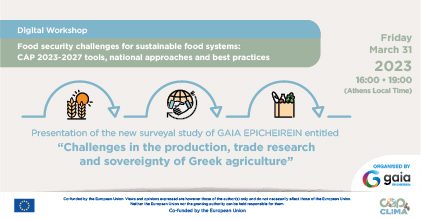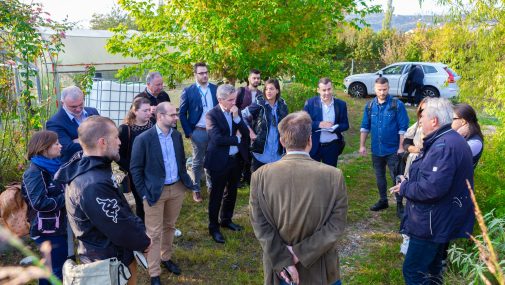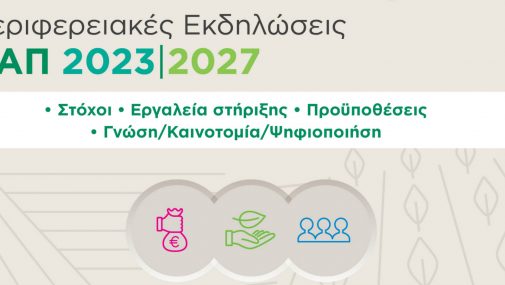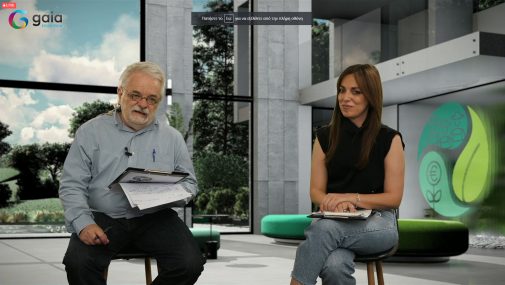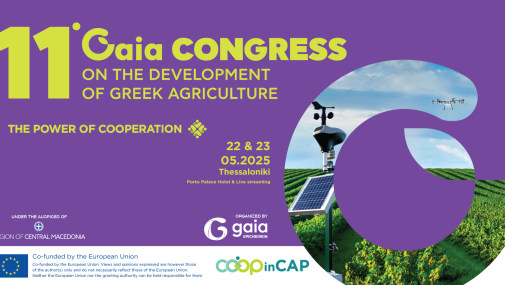This website uses cookies so that we can provide you with the best user experience possible. Cookie information is stored in your browser and performs functions such as recognising you when you return to our website and helping our team to understand which sections of the website you find most interesting and useful.
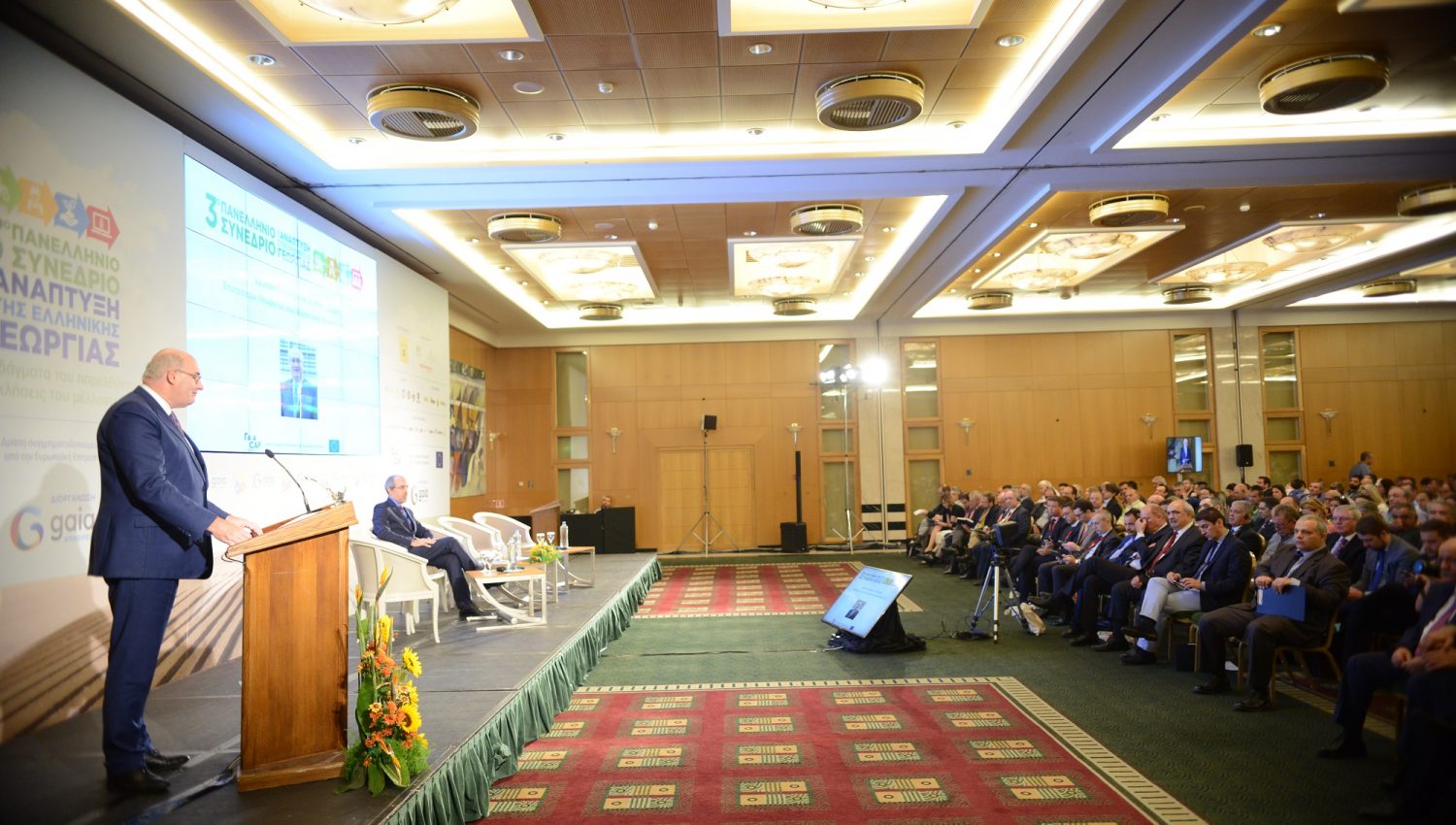
The 3rd Panhellenic Congress on the Development of Greek Agriculture was a resounding success, with the participation of 700 delegates, including more than 200 representatives of agricultural cooperative organisations and businesses from other EU member-states. The subject of the congress was, ‘CAP: learning from the past in order to prepare the future ’, and it aimed to highlight the experiences, concerns, and challenges facing the implementation of the CAP in the EU, and specifically in Greece. Shifting balances in international markets, escalating competition, and the European agricultural sector in crisis in particular, marked the discussions and concerns of attendees at the congress on the future of the CAP after 2020.
The European Commissioner for Agriculture and Rural Development, Mr Phil Hogan, declared the opening of the 3rdPanhellenic Congress with his address. In his speech, the Commissioner stressed that Greek fruit & vegetable Producer Organisations cover only 14% of the marketable production value, a very low percentage in comparison to other member-states, and underlined the importance of cooperation in order to strengthen the negotiating power of producers, improve their position in the supply chain and obtain a better income. “I believe”, the Commissioner noted, “that by focusing on your strengths, you can create a better agricultural sector”, encouraging Greek farmers to move towards powerful cooperative schemes, in order to develop primary production and enhance entrepreneurship.
He added that innovation in agricultural production could help the Greek economy exit the crisis, while in reference to the Rural Development Programme, he stressed that it is a very important funding tool that will revive the rural world and strengthen businesses in the agri-food sector. In conclusion, Mr Hogan focused on three priorities for Greek agriculture: quality, branding and promotion.
1st Panel Session: The CAP in the South of Europe : experiences, concerns, challenges
The moderator of the 1stthematic session of the congress, Mr Vasilis Parolas, Member of the BoD of GAIA EPICHEIREIN and Vice President of Cogeca, invited to the panel Mr Giorgio Mercuri, President of the Confederation of Cooperative Organisations Fedagri-Conf cooperative and of the Association of Agri-Food Cooperatives of Italy, Mr Angel Villafranca, President of the Spanish agri-food cooperative organisation Cooperativas Agro-alimentarias, Mr Pascual Vinet, General Representative of the national cooperative organisation of France Coop de France, Mr Manuel dos Santos Gomes, President of the National Confederation of Agricultural Cooperatives and Agricultural Credit of Portugal Confagri, and Mr Giannis Koufoudakis, CEO of GAIA EPICHEIREIN.
At the start of the discussion, Mr Parolas mentioned that this thematic session is essentially a “summit” of cooperative organisations of the European South, which is being held following the recent meeting of agricultural and cooperative organisations of the member-states of the European South, which was held in Rome, Italy. At a crucial and early stage of the discussions on the future CAP, it was considered important to hear the views of cooperatives of the South and examine how their principles and values can be preserved, and how they can progress in a world that is changing at an increasingly rapid speed, impacting European agricultural policy.
The discussion was based on the questions that were addressed to all speakers, which concerned the major challenges that all cooperatives face, the degree to which the tools available in the framework of the current CAP meet the needs of cooperatives in the countries of the EU South overall, and how and under what conditions European policies complementary to the CAP (such as the international trade policy, competition policy, research and innovation policy, overall developmental and investment policy of the European Commission, etc.) could support the agricultural cooperatives of the EU South.
The conclusions of the discussion can be summarised as follows:
- Developments in international agricultural markets and the productive process itself, with the enhanced role of innovation at the focus, mark the beginning of a new era of opportunities and challenges for agricultural cooperatives; the willingness of all stakeholders to seize the opportunities and face the challenges was underlined.
- Cooperatives are enterprises that need support through instruments that do not intervene, but rather frame their operation and strengthen their competitiveness, in the framework of national policies, the CAP or through complementary European Union policies.
- It is certain that cooperatives will play an active role in the framework of the discussions on the post-2020 CAP model. For cooperatives of the South in particular, which are being called upon to face inherent structural difficulties, it is critical for these difficulties to be taken into account when planning future support instruments and policies for the EU agricultural sector.
- The cooperatives of the South are in favour of a Common (this was underlined) Agricultural Policy that is strong yet simple to implement, and will ensure the creation of value for all agricultural cooperatives of Europe.
- Collective action is a way of life and a continuous goal for cooperatives, and in that framework, the latter will work together and collaborate in order to achieve this goal.
2nd Panel Session: Policies and tools for the future CAP
The moderator of the 2nd session, Ms Elli Tsiforou, head of the Brussels Office of GAIA EPICHEIREIN, noted that quality, promotion, certification, the role of financial instruments and risk management tools, as well as the contribution of new technologies in supporting European agriculture, are important issues that have already been discussed at EU level, and which are expected to be at the focus of the post-2020CAP model. In the framework of the 2nd session, distinguished speakers from Greece and the EU were invited to analyse and approach the above-mentioned issues. More specifically:
The Senior Policy Advisor at the European agricultural and cooperative organisations Copa-Cogeca, Mr Xavier Valle, who specialises in issues relating to the quality and promotion of agricultural products, food and animal feed safety, labelling, nutrition and health, referred to current and future challenges for agricultural product quality and promotion policies.
Mr Konstantinos Mavropoulos, Director of Development of the Agri-food Sector of TÜV AUSTRIA HELLAS, focused on the importance of certification systems in ensuring the quality and safety of foods throughout the food supply chain, and on issues relating to the implementation of mandatory and voluntary systems.
Mr Ioannis Chaniotakis, Director of Agricultural Sector Operations Development at Piraeus Bank, referred to the role of financial instruments in the support and development of the primary sector in the present and the future, focusing on how they complement European and national policies, and on the requirements by which they can become more accessible and attractive to producers.
Ms Effie Kokoreli, Agrinsurance & Bancassurance Director at Interamerican S.A., presented current and future risk management instruments for insuring production and income, referring both to the risks from natural disasters, and to financial risks due to agricultural market instability, which has become the new normal in the EU primary sector.
The Director of Research and Development at NEUROPUBLIC S.A., Mr Panagiotis Ilias, referred to the concerns currently expressed on an EU level regarding the introduction of new technologies into the agri-food sector and the ways in which it is expected to be impacted, and how the European and international agricultural sector will be called upon to adapt.
The common thread in the discussions held in the framework of the 2ndthematic session was the need for synergies between all stakeholders in the agri-food sector in Greece, so that Greek agriculture can become more competitive.
3rd Panel Session: Positions and proposals on cooperative entrepreneurship
The moderator of the 3rdSession, Mr Vasilis Kappas, Director of Entrepreneurial Development at GAIA EPICHEIREIN, invited experienced speakers to the panel in order to discuss concerns and proposals regarding the development of cooperative entrepreneurship in Greece’s agricultural sector. More specifically:
Mr Georgios Chatzigeorgiou, Economist and business executive, stressed that the agricultural supply market (animal feed, fertilisers, pesticides, seeds, and propagating material) is characterised by fragmentation, with approximately 60%-70% of purchases being made from approximately 2500 agricultural supply stores around Greece, while the share of cooperative stores ranges from 10% to 20%. In order to reduce the cost of these inputs, collective actions are required especially in Greece whose structural characteristics make such actions a necessity. Collective actions can take place via the development of cooperatives, producer organisations and producer groups collaborative schemes. These schemes, after gathering the necessary inputs, can achieve significant economies of scale with a reduction of input cost to the benefit of their producer-members. The important problem of liquidity may also be solved through sound organisation and contractual farming. At the same time, the input cost may be reduced through the use of terrain data and the provision of specialised advice on sound and best practices. Reducing inputs to those strictly necessary for each crop could lower production costs by more than 20% for fertilisers and more than 25% for pesticides.
Mr Charalambos Filadarlis, Director of Export Support and Development of GAIA EPICHEIREIN, emphasised the need for current cooperative structures to join forces in order to create economies of scale and large final product figures, so as to increase the negotiating power of cooperatives vis-à-vis large supermarket chains. At the same time, he recommended turning to high added value products in contrast to mass production of products that are characterised as commodities with a low added value.
Mr Athanasios Tsiotinas, President of the Arcadia Agricultural Livestock Cooperative, highlighted the need for producers to change their attitude, with the aim to create new and healthy cooperative schemes based on solid principles and values, and achieve entrepreneurial growth. Furthermore, he stressed the need to introduce innovation into agricultural production, as the main factor for improving the competitiveness of Greek agricultural products.
Mr Christos Giannakakis, Advisor of the Venus Growers Agricultural Cooperative, analysed the significant advantages to agricultural products from promotional actions subsidised by EU programmes. The added value a product takes on through these activities is significant, while these initiatives contribute to the differentiation of the product in the eyes of the end consumers.
